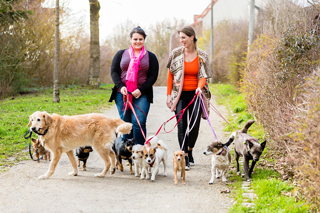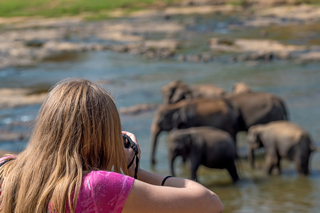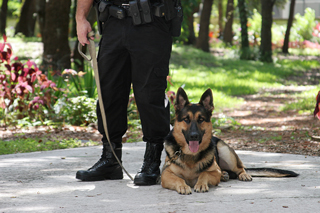Get started now.

22 Amazing Jobs With Animals
Jobs with animals can be some of the most rewarding—especially when you can help make their lives healthier and happier. After all, animals can be extremely loyal and appreciative. According to the U.S. Centers for Disease Control and Prevention (CDC), having pets can lower people's blood pressure and reduce their cholesterol levels. It stands to reason that jobs working with animals could bring similar benefits. Is it any wonder so many people prefer to spend their workdays among non-human creatures?
Canadians do love their animals. Pet ownership in this country has grown significantly over the last few years. The Canadian Animal Health Institute notes that around 41 percent of Canadian households have at least one dog, and 38 percent have at least one cat. That means growing opportunities in all sorts of animal-related careers.
Many animal lovers dream of becoming veterinarians, but that is by no means the only option. There are many different types of jobs that work with animals, and they require varying levels of education and experience. Whether you're interested in caring for, protecting, studying, or training animals, there are plenty of exciting possibilities out there. Explore the animal careers list below to get inspired!
- Careers in veterinary services
- Non-veterinary animal care jobs
- Jobs that involve studying animals
- Additional careers with animals
Careers in Veterinary Services
 Do you want to devote your career to the physical well-being of creatures great and small? Careers in veterinary services are probably the best-known jobs that involve animals. It's no secret that being able to contribute to the healing of a sick or injured animal can be immensely rewarding. Consider these occupations:
Do you want to devote your career to the physical well-being of creatures great and small? Careers in veterinary services are probably the best-known jobs that involve animals. It's no secret that being able to contribute to the healing of a sick or injured animal can be immensely rewarding. Consider these occupations:
1. Veterinary assistant
With a unique combination of animal care skills and administrative abilities, veterinary assistants are essential to the operation of veterinary clinics and hospitals. Assistants feed and bathe animals, clean exam rooms and treatment areas, and hold animals during procedures. They also schedule appointments, handle billing, and perform other clerical tasks.
2. Veterinary technician
Drawing blood, placing catheters, performing lab tests, and assisting in surgery are typical tasks of veterinary technicians. You have to know how to work with animals and people, since many technicians talk to pet owners about caring for their recovering animals. In some provinces, technicians must be registered.
3. Veterinarian
When it comes to jobs involving animals, this is usually the first one people think of. Veterinarians diagnose and treat injuries and illnesses in all types of animals. They set bones, dress wounds, fix teeth, prescribe medications, and perform surgery. It takes at least six years of university training to become a veterinarian, but getting the chance to help animals heal can make it all worthwhile.
4. Veterinary pathologist
Veterinary pathologists are veterinarians who take additional training to specialize in animal diseases. They use specialized lab equipment to examine animal tissues and fluids for signs of disease conduct research ways to treat and prevent diseases. They also perform necropsies to determine how an animal died. In Canada, veterinary pathologists must be certified by the American College of Veterinary Pathologists.
5. Veterinary ophthalmologist
Another potential area of specialization for licensed veterinarians is ophthalmology, which focuses on problems affecting the eyes. Veterinary ophthalmologists diagnose and treat eye conditions, and they conduct routine eye exams and perform surgery when necessary. To work in this field in Canada, you'll need to be certified by the American College of Veterinary Ophthalmologists.
Non-Veterinary Animal Care Jobs
 Veterinary careers might first come to mind when you consider working with animals. However, there are other ways to make a career out of caring for animals. Some of these jobs can be had with little or no experience, while others require a bit of special training. Here are a few examples of animal care jobs outside of veterinary services.
Veterinary careers might first come to mind when you consider working with animals. However, there are other ways to make a career out of caring for animals. Some of these jobs can be had with little or no experience, while others require a bit of special training. Here are a few examples of animal care jobs outside of veterinary services.
1. Dog day care manager
Busy pet owners are increasingly turning to dog day cares to allow their dogs to be active and social while the owners are at work. Day care managers evaluate each dog's energy level and temperament, provide supervised play and rest areas, and ensure that all animals in the facility stay safe. It's important to be certified in pet CPR.
2. Wildlife rehabilitator
Wildlife rehabilitators help injured animals recuperate before they are released into their natural habitats. You feed and clean up after the animals and provide basic first aid in this role. As a wildlife rehabilitator, the amount you make can vary considerably. Many rehabilitators are volunteers, but some paid positions are available in humane societies and large organizations.
3. Pet sitter
Caring for pets in their own homes while owners are working or travelling is the job of pet sitters. Typical tasks include putting out food, changing water bowls, cleaning litter boxes, and providing companionship. Some sitters stop by for an hour or so; others stay overnight in a client's home. No experience is required to do this kind of work.
4. Dog walker
Dog walking is one of the most common jobs involving dogs. Many owners hire professional dog walkers to make sure their canine friends get their daily dose of exercise. Walkers take the dogs out, clean up after them, and make sure they behave appropriately in public areas. In cities like Toronto and Vancouver, dog walkers need a permit to be out and about with more than three dogs at a time.
5. Animal shelter manager
Animal shelter managers provide a safe haven for injured, abandoned, and unwanted animals. They are responsible for the shelter's operation, which means they supervise staff, manage budgets, maintain the facilities, and make sure all animals receive appropriate care. Courses in business management can be good training for this career.
6. Pet groomer
Pet groomers give pets (mostly dogs) a healthy and attractive appearance. Pet groomers brush and comb fur, apply shampoo and conditioner, cut nails, clean ears, trim hair, and sometimes brush teeth. You don't need formal training for this job. However, some groomers opt to take courses through the National Groomer Association of Canada.
7. Animal care attendant
Sometimes known as animal care assistants, these workers care for animals in kennels, shelters, and pet shops. They prepare food, clean and disinfect living areas, and take dogs out for walks. They also note any signs of illness or discontent in the animals and report their findings to veterinary staff. Training is normally provided on the job.
Jobs That Involve Studying Animals
 Observing or photographing creatures in their natural habitat means getting out of the office and into the field (or ocean).
Observing or photographing creatures in their natural habitat means getting out of the office and into the field (or ocean).
1. Zoologist
Despite the name, zoologists aren't just concerned with animals in zoos. These professionals study the behaviour and life cycles of various animals, from mammals and birds to insects and fish. Some work in labs, while others study wildlife in nature reserves. A bachelor's degree can get your foot in the door, but you'll need at least a master's degree to do independent research.
2. Wildlife biologist
Wildlife biologists examine the natural habitats and behaviours of animals. They study different species to learn how the animals fit into their ecosystems and interact with people. Wildlife biologists collect data on animal populations, assess the potential impact of commercial development on animal habitats, and research ways to manage endangered species.
3. Marine biologist
Since the job of marine biologists is to study all types of ocean life, many of them spend extensive time out at sea. You could be researching the migratory patterns of humpback whales or examining the effect of warmer ocean temperatures on the distribution of mollusks. A big part of this job is compiling data and writing reports. Some marine biologists also work as teachers or professors.
4. Wildlife photographer
Patience and adaptability are vital traits for wildlife photographers. Capturing images of animals in their natural environment means spending long periods of time waiting for your subjects to appear—but when they do, you need to be ready. Photography training is important, but biology courses that focus on animal behaviour can also be useful.
Additional Careers With Animals
 There are many other ways to work with animals. You could protect them, teach them new skills, cater to their tastes, or partner with them to apply their unique abilities toward the greater good. Following are a few more animal jobs that don't fit into the other categories.
There are many other ways to work with animals. You could protect them, teach them new skills, cater to their tastes, or partner with them to apply their unique abilities toward the greater good. Following are a few more animal jobs that don't fit into the other categories.
1. Police dog handler
Many police forces across Canada have K9 units where officers and their specially trained dogs locate missing people, track suspects, detect drugs, or sniff out explosives. K9 officers live with their dogs and care for them around the clock. You'll need to become a police officer and go through a selection process to join the K9 unit.
2. Conservation officer
Patrolling forests and lake areas and investigating illegal hunting or fishing cases are common tasks of conservation officers. They have all the authority of police officers and are responsible for enforcing government regulations related to protecting wildlife. They also educate the public about conservation issues. Law enforcement training can be useful, as can courses in natural resource management.
3. Therapeutic riding instructor
Did you know that horses can contribute to people's physical, cognitive, and emotional well-being? Therapeutic riding instructors use horseback riding to help children and adults with disabilities develop mobility and balance, improve muscle tone, and foster a sense of achievement. Instructor certification is available through the Canadian Therapeutic Riding Association.
4. Animal cruelty investigator
Advocating for animal welfare is the primary role of animal cruelty investigators. These law enforcement professionals look into reports of animals being neglected or abused. They have full authority to issue orders, bring charges, and remove animals from unsafe environments if necessary.
5. Pet bakery owner
More and more pet owners like to buy treats for their animals. Pet bakery owners serve this growing market by providing high-quality cakes, cookies, and other snacks for cats and dogs. Some bakers even offer a catering service for pet birthday parties. Be sure to research the regulations that apply in your area.
6. Dog trainer
Trainers feature prominently on any list of careers with dogs. They might perform basic obedience training or prepare the dogs for specialized tasks like police work. Learning to become a dog trainer normally involves observing and learning from an experienced trainer, but professional certification is available. An animal trainer's salary will largely depend on the trainer's experience and education.


